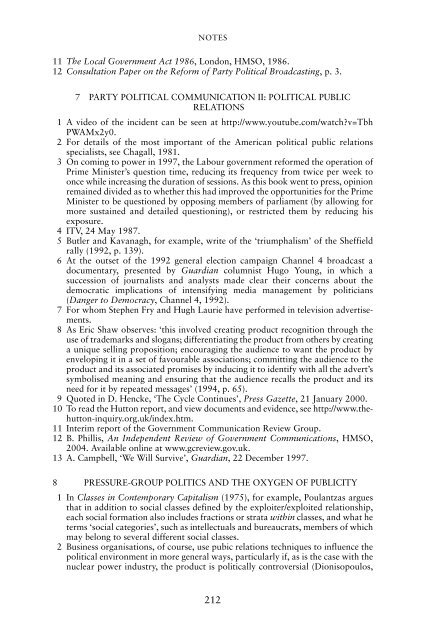20130412164339753295_book_an-introduction-to-political-communication
20130412164339753295_book_an-introduction-to-political-communication
20130412164339753295_book_an-introduction-to-political-communication
You also want an ePaper? Increase the reach of your titles
YUMPU automatically turns print PDFs into web optimized ePapers that Google loves.
NOTES<br />
11 The Local Government Act 1986, London, HMSO, 1986.<br />
12 Consultation Paper on the Reform of Party Political Broadcasting, p. 3.<br />
7 PARTY POLITICAL COMMUNICATION II: POLITICAL PUBLIC<br />
RELATIONS<br />
1 A video of the incident c<strong>an</strong> be seen at http://www.youtube.com/watch?v=Tbh<br />
PWAMx2y0.<br />
2 For details of the most import<strong>an</strong>t of the Americ<strong>an</strong> <strong>political</strong> public relations<br />
specialists, see Chagall, 1981.<br />
3 On coming <strong>to</strong> power in 1997, the Labour government reformed the operation of<br />
Prime Minister’s question time, reducing its frequency from twice per week <strong>to</strong><br />
once while increasing the duration of sessions. As this <strong>book</strong> went <strong>to</strong> press, opinion<br />
remained divided as <strong>to</strong> whether this had improved the opportunities for the Prime<br />
Minister <strong>to</strong> be questioned by opposing members of parliament (by allowing for<br />
more sustained <strong>an</strong>d detailed questioning), or restricted them by reducing his<br />
exposure.<br />
4 ITV, 24 May 1987.<br />
5 Butler <strong>an</strong>d Kav<strong>an</strong>agh, for example, write of the ‘triumphalism’ of the Sheffield<br />
rally (1992, p. 139).<br />
6 At the outset of the 1992 general election campaign Ch<strong>an</strong>nel 4 broadcast a<br />
documentary, presented by Guardi<strong>an</strong> columnist Hugo Young, in which a<br />
succession of journalists <strong>an</strong>d <strong>an</strong>alysts made clear their concerns about the<br />
democratic implications of intensifying media m<strong>an</strong>agement by politici<strong>an</strong>s<br />
(D<strong>an</strong>ger <strong>to</strong> Democracy, Ch<strong>an</strong>nel 4, 1992).<br />
7 For whom Stephen Fry <strong>an</strong>d Hugh Laurie have performed in television advertisements.<br />
8 As Eric Shaw observes: ‘this involved creating product recognition through the<br />
use of trademarks <strong>an</strong>d slog<strong>an</strong>s; differentiating the product from others by creating<br />
a unique selling proposition; encouraging the audience <strong>to</strong> w<strong>an</strong>t the product by<br />
enveloping it in a set of favourable associations; committing the audience <strong>to</strong> the<br />
product <strong>an</strong>d its associated promises by inducing it <strong>to</strong> identify with all the advert’s<br />
symbolised me<strong>an</strong>ing <strong>an</strong>d ensuring that the audience recalls the product <strong>an</strong>d its<br />
need for it by repeated messages’ (1994, p. 65).<br />
9 Quoted in D. Hencke, ‘The Cycle Continues’, Press Gazette, 21 J<strong>an</strong>uary 2000.<br />
10 To read the Hut<strong>to</strong>n report, <strong>an</strong>d view documents <strong>an</strong>d evidence, see http://www.thehut<strong>to</strong>n-inquiry.org.uk/index.htm.<br />
11 Interim report of the Government Communication Review Group.<br />
12 B. Phillis, An Independent Review of Government Communications, HMSO,<br />
2004. Available online at www.gcreview.gov.uk.<br />
13 A. Campbell, ‘We Will Survive’, Guardi<strong>an</strong>, 22 December 1997.<br />
8 PRESSURE-GROUP POLITICS AND THE OXYGEN OF PUBLICITY<br />
1 In Classes in Contemporary Capitalism (1975), for example, Poul<strong>an</strong>tzas argues<br />
that in addition <strong>to</strong> social classes defined by the exploiter/exploited relationship,<br />
each social formation also includes fractions or strata within classes, <strong>an</strong>d what he<br />
terms ‘social categories’, such as intellectuals <strong>an</strong>d bureaucrats, members of which<br />
may belong <strong>to</strong> several different social classes.<br />
2 Business org<strong>an</strong>isations, of course, use pubic relations techniques <strong>to</strong> influence the<br />
<strong>political</strong> environment in more general ways, particularly if, as is the case with the<br />
nuclear power industry, the product is <strong>political</strong>ly controversial (Dionisopoulos,<br />
212
















